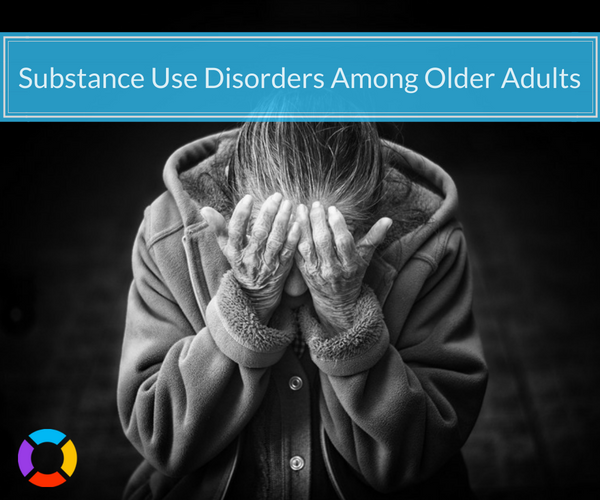Addiction in the Elderly: Signs, Risks, and Finding Detox or Rehab for Seniors

Addiction can happen to someone of any age, and often the signs of addiction in the elderly go unnoticed. Learning about the signs, risks, and how to find treatment for seniors can help you or a loved one begin your recovery journey.
Call now to find drug and alcohol detox centers near you!
The Hidden Epidemic of Senior Substance Abuse and Addiction
Addiction in older adults may be more prevalent than you think.
Looking at statistics around alcohol use among seniors, we find:
- 12% of people ages 65+ reported binge drinking in the previous month.
- Almost 5% of people ages 65+ met the criteria for past-year alcohol use disorder.
- 38% of all alcohol-related deaths in 2020 and 2021 were people aged 65+.
- The number of drinkers in people ages 65+ has increased 80% between 2002 and 2019.
NIDA also reports rising numbers in drug use among elderly adults:
- The U.S. population of adults 55 and older increased by about 6% between 2013 and 2015, yet the proportion of people in that age group seeking treatment for opioid use disorder increased nearly 54% during the same time span.
- The proportion of older adults using heroin more than doubled between 2013 and 2015.
- 9% of adults aged 50-64 reported past-year marijuana use in 2015-2016, compared to 7.1% in 2012-2013.
Elderly addiction often goes unnoticed or is misdiagnosed because doctors may confuse substance use disorder symptoms with those of other chronic health conditions or with natural changes that occur with aging.
Fortunately, substance abuse in elderly adults is treatable. Detox and rehab for the older population are widely available and shown to be effective in treating addiction in seniors.
Why Are Seniors at Risk for Addiction?
Aging and addiction may not seem like they go hand in hand, but there are several factors that put seniors at risk for addiction. Drug and alcohol use in the elderly can be influenced by life transitions that occur in later stages of life.
These include:
- Grief associated with various losses such as the death of loved ones, changes in personal independence, and living arrangements
- Isolation that can occur with aging
- Chronic pain and health issues that may arise over time
- Adjusting to retirement after years of active work
These life transitions can cause mental and emotional distress, which can lead to elderly drug addiction if individuals seek to cope with those stresses through substance use.
Other factors might influence the link between substance abuse and the elderly, such as polypharmacy. This term refers to an individual taking multiple drugs at the same time. Many elderly adults are being medicated for various conditions at once, which can lead to a greater risk of misusing prescription drugs.
Seniors also experience a decreased metabolism as they age. This increases their sensitivity to drugs and alcohol, putting them at a higher risk of developing a dependence or addiction to the substance.
Signs of Substance Abuse in Older Adults
What are the signs of alcohol abuse in older adults? They include the general signs for alcohol use disorder (AUD), but they also include some age-specific signs. The same is true for signs of other drug use in older adults.
Things to watch for include:
- Confusion
- Falling
- Memory loss
- Secrecy or hiding things
- Increased irritability
- Neglected appearance
Sometimes it can be hard to spot drug abuse and alcohol abuse in older adults since there is quite a bit of overlap with signs of dementia and normal aging. If you notice some red flags about a loved one’s behavior, step in to offer support and guidance on where to seek help.
Common Substances Misused by Seniors
The most commonly misused substance among the elderly is alcohol. Alcohol use disorder (AUD) in the elderly is most common among those with health and psychiatric issues.
A recent study shows that 30% of all older patients hospitalized in general medicine and up to 50% of older patients hospitalized in psychiatric units have AUD. Elderly alcohol addiction has seen increases over the past several years.
There’s no shame in asking for help. Call now and speak with someone!
Elderly drug addiction and substance abuse is also on the rise, with prescription drug misuse in older adults being a common occurrence.
Some of the drugs commonly prescribed to the elderly include:
- Opioids for chronic pain
- Benzodiazepines for anxiety and seizures
- Various sleeping medications
These prescription medicines carry a high risk of addiction and dependence. Aside from prescription drugs, marijuana is also commonly misused by seniors.
The Dangers of Alcohol and Drug Use in Seniors
Alcohol and drug use are dangerous at any age; however, there are specific risks for those at an older age.
Seniors who use substances have a higher risk of:
- Overdose
- Impaired judgment
- Injuries
One of the other dangers for seniors is the worsening of co-occurring conditions when adding substances into the mix. Substance abuse and dementia is one example of this.
Drugs and alcohol can often exacerbate symptoms of dementia leading to more confusion, irritability, and memory loss. Other conditions, such as diabetes and osteoporosis, are also worsened by substance use.
Studies show that there are unique risks of alcohol withdrawal in elderly individuals, including:
- Delirium
- Seizures
- Confusion
- Mood disturbances
- Increased sensitivity to pain
How to Talk to a Senior Loved One About Getting Help
When dealing with seniors and addiction, you may need to start by overcoming a few obstacles. Denial of a problem is very common in older-adult addiction cases and can be difficult to navigate. Many people also struggle with stigma and shame around addiction, which can create barriers to seeking help.
Here are a few tips for family members or caregivers to follow when talking with a loved one about starting treatment:
- Start by asking open questions about their health and substance use
- Refrain from making judgmental statements
- Express concern for their well-being and mention signs if necessary
- Share statistics on senior adult substance abuse to normalize their experience
- Discuss options for care so they feel they have agency in the process
Addiction Treatment Options for Older Adults
Rehab for older adults is not too different from any other rehab experience. Your specific treatment plan will be decided by a team of professionals, but you can expect it to follow some basic steps.
The first step in elderly substance abuse treatment is often medical detox. Detox for seniors will look similar to regular detox; however, the importance of medical supervision during the withdrawal process is even higher for older patients.
Not sure how to take the first step? Call today and get the help you need.
Once you have detoxed, the next step is often inpatient or outpatient care. A provider may recommend inpatient rehab for elderly participants who have underlying health issues or who lack a robust support system at home.
Outpatient rehab for seniors is also an option if your treatment team feels confident about your ability to maintain your recovery journey while living outside of the facility.
Older adult rehabs specialize in age-friendly programs and provide clinicians who have been trained in geriatric addiction. This is why it would be beneficial to look for a drug rehab for elderly patients as opposed to a general rehab program.
What to Expect in Senior Rehab Programs
While senior addiction treatment will vary from one facility to another, you can expect the following general features at a drug rehab for senior citizens:
- Mental health therapies tailored to memory and cognitive support
- Exercise or movement programs suited to mobility levels
- Peer group support with other seniors
- Medication management
- Chronic care coordination
When searching for treatment, consider specifying in your search terms that you are looking for elderly rehab or retirement addiction treatment to find facilities that cater to your specific needs.
Here are some top senior addiction treatment facilities:
- Recovery Keys St Augustine in Florida
- The Vines Hospital in Florida
- Major General William H Gourley VA DoD Outpatient Clinic in California
- Present Moments Recovery in California
- Phoenix House in Texas
- Brazos Place Behavioral Health Center in Texas
- Community Bridges transition point in Arizona
- Horizon Health and Wellness
Medicare for Rehab? Insurance Coverage and Cost of Treatment for Seniors
Cost of treatment varies widely depending on a variety of factors. If costs are a concern to you, consider insurance options as well.
Medicare is an insurance option that is funded by the government and provides low-cost healthcare coverage for individuals ages 65 and older. Does Medicare cover rehab? The simple answer is yes. However, the extent of the coverage will vary from one rehab to another and also depend on your specific Medicare plan.
Private insurance for senior rehab is another option. Some people have a private insurance plan that covers all of their healthcare needs, while others may have a supplemental private plan that covers what their Medicare plan does not.
Beginning treatment early can actually save you money in the long run by ensuring you get the help you need before symptoms or issues worsen with prolonged substance misuse.
If you are still unsure about your treatment options and insurance coverage, call now for help verifying your insurance.
Long-Term Support and Relapse Prevention
As you prepare to leave rehab, your team will work with you to develop a relapse prevention plan. Relapse in older adults is very common and does not equate to failure in recovery. Senior recovery programs help prevent relapse by providing access to resources for long-term support.
Aftercare resources for elderly individuals include:
- Family support groups or family therapy
- Sober living programs
- Case managers who will help guide you through aftercare
- 12 Step meetings or other groups tailored to seniors
- Ongoing individual therapy
- Regular check-ins with your primary care physician
Getting Help Is the Healthiest Option at Any Age
Substance abuse in the elderly is common, and it is treatable at any age. If you are seeing signs of addiction in seniors you love, it is never too late to seek care. Take action today to help yourself or your loved one begin their recovery journey.
Visit Detox.com or call the number below for immediate help finding safe, compassionate detox and rehab for elderly addiction.



